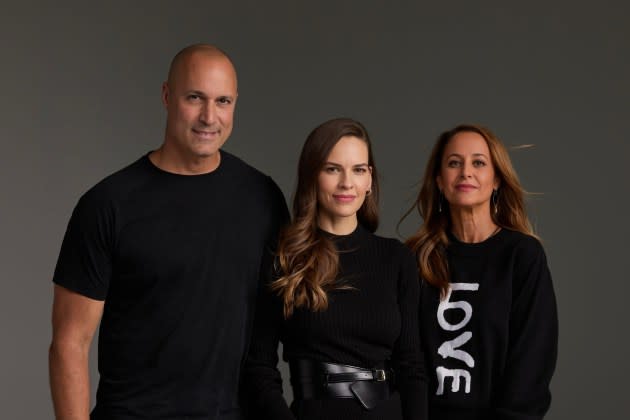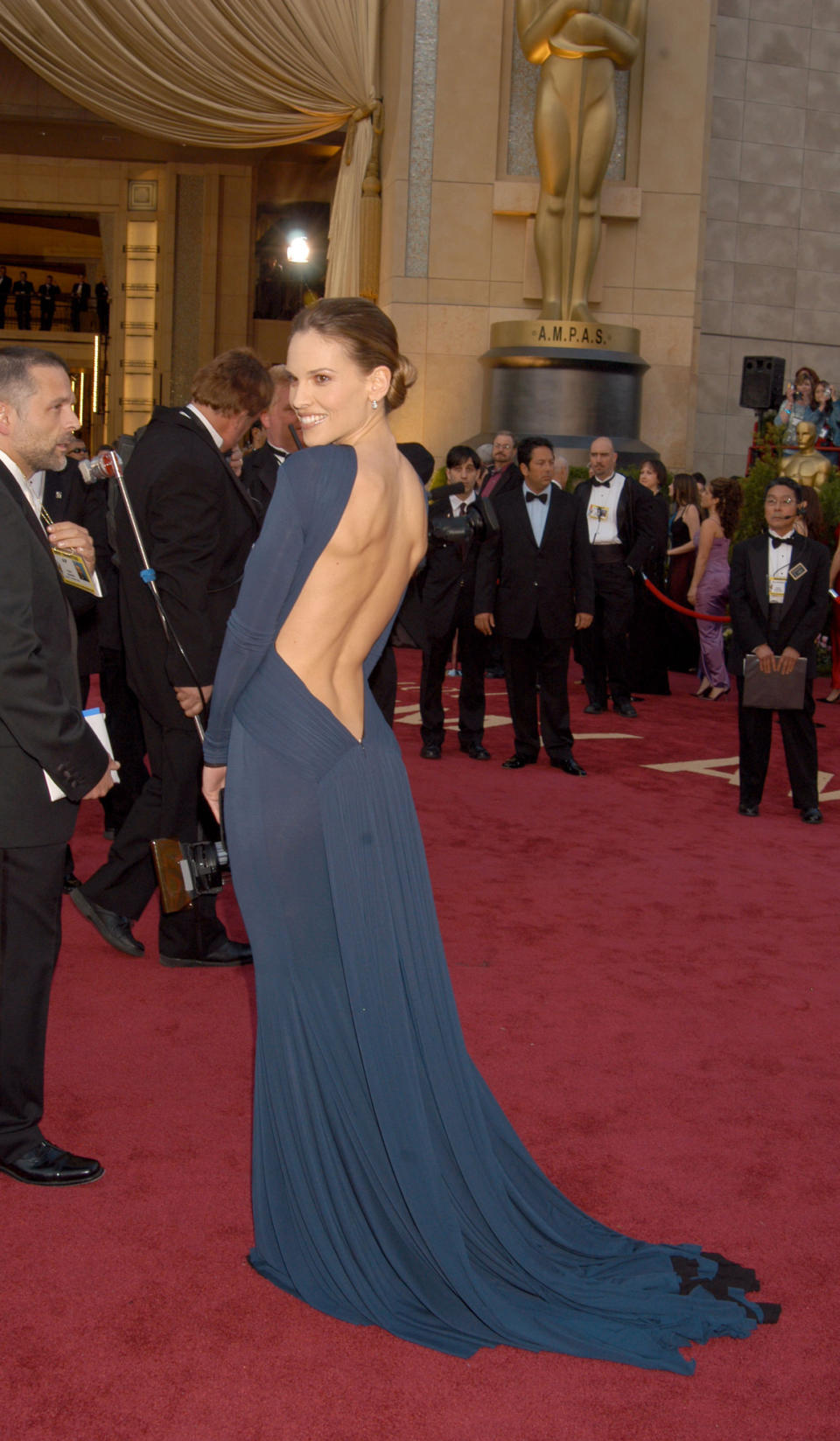Actress Hilary Swank Talks Red Carpet, Sustainability and Teaming Up With Ecofashion

Eight years after starting her sustainable clothing label Mission Statement, the Oscar-winning actress Hilary Swank has sold the company to Ecofashion and is now part of that sustainability conglomerate’s executive team.
As a design director and brand ambassador, Swank will be working shoulder-to-shoulder with founder Marci Zaroff and creative director Nigel Barker, the fashion photographer who many know from his “America’s Next Top Model” days. Terms of the deal were not revealed.
More from WWD
Credited with coining the term “ecofashion” in 1995, Zaroff’s portfolio includes the contemporary sustainable brand YesAnd, Farm to Home bed and bath products and MetaWear, a business-to-business sustainable clothing and home decor manufacturing platform.
Swank models in the campaign for YesAnd Little Black Dresses, an eight-piece capsule collection with an average price of $90. The dresses and cardigans are being offered via the subscription service DailyLook by Adore Me. Swank will design her first capsule collection next season.
In between feeding her 11-month-old twins, Swank discussed her latest endeavor, the give-and-take of red carpet dressing and fast fashion’s impact on our consumption economy. Motherhood is only one of the reasons why she wanted to have a more far-reaching voice about environmentalism, she said. (Swank took on the role of chief innovation officer at HealthyBaby just last week.)
“We are a disposable culture — food, movies, toys and clothing. As a mother, I want to look at the future for my babies, who are waving at me [laughs] and smiling. I’m being conscientious about what they’re wearing, consuming and the toys they are playing with,” she said.
By being more vocal about environmentalism, Swank also aims to reel in more brands to use Ecofashion’s RESET farming — an acronym for “regenerate the environment, society and economies through textiles,” and MetaWear’s B2B manufacturing platform.
“We know that fast fashion is just so dangerous to the environment. It’s so dangerous to the people who are making it. Our bigger vision is to transform the [nearly] $2 trillion global fashion industry into a force for good. We have a love for people, the planet and purpose. Both Marci and I have a determination to make a real difference.”
A Junior Olympics swimmer who boxed and trained nearly five hours a day for her “Million Dollar Baby” Oscar win, Swank hopes to bolster conscientious spending and to steer more brands to Ecofashion for their turnkey capabilities. “’Sustainability’ is a word that is thrown around so much that people aren’t really responding to that. It’s what we know we should be doing. But a lot of people say they are and they aren’t,” Swank said.
The United Nations’ Environment Program said that throwaway fashion is up 36 percent from 15 years ago. Speculating that consumers “have just gotten away from understanding such proliferation,” Swank said, “They don’t even give it away. I don’t think they’re even aware of what’s happening and how that’s damaging our planet. That’s why the idea of being cleaner, greener, kinder and more responsible is so important. If we can really come together, we can talk about it in a bigger way.”
Interestingly, her just-released feature film, “Ordinary Angels,” is about a community coming together to help one another. “That’s something that has been lost in the world at this moment. Any time that we can remind people of that through movies, fashion or anything is good. Art is a good conduit to that,” she said.

Sustainability is not a new phenomenon for Swank, whose choice of a backless Guy Laroche gown caused an uproar at the 2005 Oscars. Sex appeal aside, celebrities had yet to warm up to vintage styles. In line with her “I’m-just-a-girl-from-a-trailer-park-that-had-a-dream” acceptance speech that night, Swank still values thriftiness. “Growing up, when we bought something, it had to go the distance. I had to wear it until it wore out completely, or I grew out of it,” she explained. “That’s just what has made my character. It was most likely due to being in a lower socioeconomic background that led us to that. But I’m so grateful for that. I’m glad that I didn’t have 10 pairs of tennis shoes. I had one pair and they went the distance. That infused who I am.”
Mission Statement’s ethos, for example, is meant to try to offset the practice of Americans wearing only 20 percent of their wardrobes 80 percent of the time — a statistic brought to light by “You Are What You Wear” author Jennifer Baumgartner. Allowing that sustainable options can be more costly, Swank advocates for spending a little more for items that stand up over time and can be passed down. Having heard firsthand from fans who feel sustainable options are a bit out of their price range, Swank said Ecofashion’s vertical operations means that she can offer them more affordable options.
Even for celebrities, she continued, “It is a business, right? I’m being lent a dress that is being made by a company that wants the publicity. We both benefit. I get a dress that’s not out yet and they get the press. Someone can say, ‘Oh, I really like that. I’d like to buy that to go to a wedding.’”

However, celebrities’ wear-it-once approach to fashion must register with young consumers subconsciously, if not consciously, Swank said. Along with being photographed in the same outfit a few times, as Swank has, she hopes to curb that one-and-done mentality by codesigning with Ecofashion. Partial to vintage, Swank said, if she could find the perfect vintage outfit for every event, that would be her course of action. “I love the way that things used to be made — even more so than now. I find the quality to be unparalleled and it’s harder to find. Nice fabrics like cashmere only get better with age,” she said.
The routine practice of not repeating an outfit for the red carpet or a key photo-op registers with young people, she said. In addition to vintage finds, Swank also said she likes to support new designers, and had her own visions for designs.
“Stepping into that world in that way has been really fun for me with Mission Statement. And as we move forward and I continue on here as codesigner, it will be as well,” she said.
Swank, who won an Oscar after her lead role in the 1999 film “Boys Don’t Cry,” about Brandon Teena, a trans man who was gang-raped and murdered in 1993, said she was well aware of the recent death of Nex Benedict, a nonbinary teen. “We’ve come a long way, but we certainly have a long way to go. I do talk about that a lot. If someone is still losing their life, or still being abused verbally, mentally or physically every day, which is happening every day in this country and around the world because of their gender, race or whatever it may be — this is an atrocity. It’s horrendous,” she said.
Best of WWD


